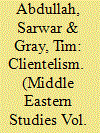| Srl | Item |
| 1 |
ID:
159014


|
|
|
|
|
| Summary/Abstract |
This article examines clientelism in Iraq as a case study of one form of corruption. Iraq is an unusual case of corruption, because a key feature of Iraq's corrupt environment is an institutionalised factional political system based on sectarian quotas. The article explores the many links between clientelism and political factionalism, discussing whether clientelism arose because of factionalism, or whether factionalism merely determines the ways that clientelism currently operates in Iraq. Using fieldwork data, the findings show there are two distinct levels of clientelism in Iraq, both of which are linked to political factions: the individual level and the organisational level. First, clientelism at the individual level entails the elites of many political factions regarding ‘money politics’ as a means of influence in Iraq/Kurdistan by buying people's affiliations and thereby governing people. Second, clientelism at the organisational level entails that the spoils of political office are shared out among the elites of the political factions in a proportionate fashion. The article concludes that clientelism is a form of political rather than economic corruption; and that while there may be some immediate value in clientelism, its long-term harm outweighs its short-term value.
|
|
|
|
|
|
|
|
|
|
|
|
|
|
|
|
| 2 |
ID:
168919


|
|
|
| 3 |
ID:
187614


|
|
|
|
|
| Summary/Abstract |
In many oil-rich-countries, diversification is often mentioned as a strategy for reducing the ‘curse’ of oil resources. This curse is twofold – economic and political. The economic curse is that over-dependence on oil and gas exports makes a country vulnerable to the fiscal shock of fluctuations in the price of oil and gas on the international markets which undermines the government's ability to deliver welfare programmes without running up large budget deficits by borrowing heavily to hedge against price falls. The political curse is that the oil resource invariably leads to elites monopolizing the resource for their own benefit. Advocates of economic diversification claim it could eliminate both economic and political curses. We test this claim in a case study of the Kurdistan Region of Iraq (KRI) where two political party elites control the region's oil resources, and where steps are being taken to develop the private sector to reduce the KRI's over-dependence on oil. Our finding is that while the elites approve of economic diversification as a means of reducing the region's reliance on oil, they are unwilling to allow the private sector to develop into an independent economic force which could challenge their political power. Accordingly, the political elites have taken charge of the economic diversification programme, but this has undermined its independent development because the two major political parties who share power in the Kurdistan Regional Government (KRG) have vested interests in continued imports of certain foreign products into Kurdistan and reduced imports of other foreign products. So, the parties manipulate the economic diversification policy and thereby undermine its effectiveness, in order to safeguard their own financial interests, and as a result the political curse has largely thwarted attempts to deal with the economic curse.
|
|
|
|
|
|
|
|
|
|
|
|
|
|
|
|